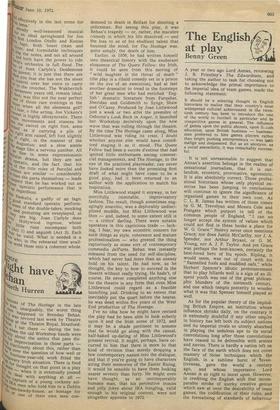Ptre
'Ight have
qian 44eth Hurren eb,eess of The Hostage in the late ll'as, unarguably, the worst thing iet happened to Brendan Behan. .'ItAit„"as revived last week by Theatre 430"P at the Theatre Royal, Stratford • Iirt sat there — during the IonhltabrIen the old Workshop hands were in'Y about the antics that pass disr ttriProvisation in those parts — N,,ractiously about this, rather than ,,be over the question of how well or ter4 faUrteen-year-old work fitted the ,1',4t1115f()rarY Irish situation. There is food 14e `,91" thought on that point in a play When it is eventually pinned th-e1? deal with anything at all — by ibeapture of a young cockney solMen who hold him in a Dublin lif;4141-bawdy-house, as hostage for df one of their own men con demned to death in Belfast for shooting a policeman. But seeing this play, it was Behan's tragedy — or, rather, the macabre comedy in which, his life dissolved — and the loss to us of his ebullient talent that haunted the mind; for The Hostage was, quite simply, the death of him. Earlier, in 1956, he had written himself into theatrical history with the exuberant eloquence of The Quare Fellow: the Irish, it could be seen from this moving of "wild laughter in the throat of death" (the play is a ribald comedy set in a prison on the eve of an execution), had at last another dramatist to tread in the footsteps of her great men who had enriched ' English ' dramatic literature from Farquhar, Sheridan and Goldsmith to Synge, Shaw and O'Casey. Produced by Joan Littlewood just a week or two atfer the premiere of Osborne's Look Back in Anger, it launched her Workshop decisively upon the new wave that was rolling through the theatre. By the time The Hostage came along, Miss Littlewood was riding its crest. I doubt whether anyone else would have considtred staging it as it stood. The Quare Fellow had been a succes d'estime that had ignited little enthusiasm among commercial managements, and The Hostage, to the eye of the practised, playreader, can never have looked more than the promising first draft of what might have come to be a good play, had it been returned to an author with the application to match his inspiration.
Miss Littlewood staged it anyway, in her mercifully inimitable, improvisatory fashion. The result, though sometimes engagingly anarchic, was a deplorably undisciplined muddle, but Miss Littlewood was then — and, indeed, to some extent still is — a critics' darling. There were notable operators in this capricious trade — lacking, I fear, my own eccentric concern for such things as style, coherence and mature professionalism — who greeted the thing rapturously as some sort of contemporary commedia de/Parte. Behan was instantly released from the need for self-discipline, which had never had more than an uneasy hold on his talent. He had now, as he thought, the key to how to succeed in the theatre without really trying. He hadn't, of course. He never completed anything else for the theatre in any form that even Miss Littlewood could regard as a feasible launching pad. Drinking to an extent that inevitably put the quart before the hearse, he was dead, within five years of the West End production of The Hostage. I've no idea how he might have revised the play had he been able to look soberly upon it and the Irish scene of 1972, and it may be a shade pertinent to assume that he would go along with the casual, half-baked up-dating of Miss Littlewood's present revival. It might, perhaps, have occurred to him that there is more to that kind of revision than merely dropping a few contemporary names into the dialogue, and, that if you're going to have characters airing their memories of the Easter Rising, it would be sensible to have them looking nearer seventy than forty. He might even have thought, as an unconquerably humane man, that his perceutive ironies and jolly jokes about IRA bungling, valid enough in his original context, were not altogether apposite to 1972.








































 Previous page
Previous page